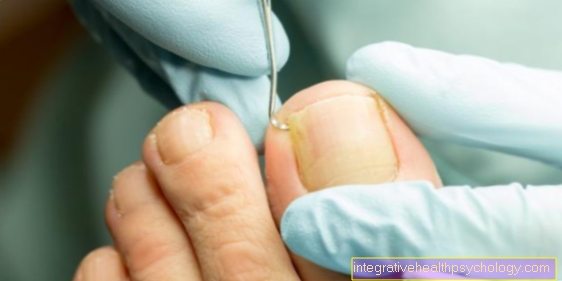Brittle hands
introduction
With brittle hands, the skin is too dry, so it becomes flaky at first and then cracked. The skin barrier is either disrupted by too little fluid or too little fat.

Causes of Brittle Hands
There are numerous risk factors that promote the development of rough skin. In addition to age and a restricted immune system, UV damage and mechanical stress are also included. Frequent contact with water and excessive use of degreasing soap dry out the skin, as do stress or sharp changes in temperature. This explains why many people only suffer from brittle hands in winter.
People who come into contact with disinfectants are particularly at risk. These have a strong drying effect.
In addition, there are pre-existing conditions that favor dry skin. These include:
- Psoriasis
- Neurodermatitis
- Diabetes mellitus
Read more on the subject below Rash on the hands
Neurodermatitis (Synonym: atopic dermatitis, atopic eczema) is a skin disease that also occurs in children. Causes are disorders of the immune function of the skin barrier and a hereditary component. Typically the skin is very dehydrated, causing severe itching. Usually, atopic dermatitis does not only affect the hands, but mainly the flexors such as the crook of the elbows, the hollows of the knees, and the neck.
The psoriasis (Synonym: psoriasis) is also an inflammatory skin disease mediated by the immune system and genetic factors. Usually the extensor sides of the legs and arms, the head and the buttocks are affected. In rare cases, however, the hands are also covered by cracked, brittle plaques.
In addition, the so-called Aging skin be responsible for brittle hands. With the term Aging skin is the slope of the skin too wrinkles, dryness, itching and Inflammation meant.
Symptoms of brittle hands
In addition to the obvious change with scales and cracks, pronounced chapped hands can also be itchy, tight or red. The risk of developing eczema or an infection is increased. Eczema is inflammation of the skin. The skin is warm and red, itches and burns. There are many causes for eczema to develop. One of them is the impaired barrier function of the skin, as it is present in brittle hands.
Read more on the topic: Hand eczema
Diagnosis
The diagnosis brittle hands is a Eye diagnosis. By asking the patient, the doctor can find out which ones root cause behind the dryness plugged. If a disease is suspected like psoriasis or Neurodermatitis the family doctor will send you a referral Dermatologist (Dermatologist), who will then take over the further treatment.
Treatment of brittle hands
In winter skin care, care must be taken to ensure that the skin is moisturized sufficiently. Creams with a high fat content or urea (urea) keep the skin supple. Urea also ensures that water is retained in the skin.
High-fat creams can contain oils from olives or almonds, evening primrose or sebum, for example. Other active ingredients can be linoleic acid or glycerine. It should be free from aggressive fragrances so as not to cause additional irritation to the damaged skin. Zinc ointments also have a healing effect.
It should be noted that good creams do not necessarily have to contain any of the ingredients mentioned above. The most important thing is a balanced distribution of fat and moisture.
If the hands are particularly brittle, a hand bath, for example with olive oil, can also help. Applied in the evening, it works particularly well because you can leave the oil on overnight with cotton gloves. Gloves are also an important companion during the day to protect your hands from direct contact with the cold, drying air. In summer, less greasy creams are usually sufficient.
Read more on the topic: Dry skin therapy.
If the skin shows signs of inflammation, your doctor or dermatologist may prescribe a cream with cortisone to reduce inflammation. In the case of infections, creams with antibacterial or antifungal (effective against fungal infections) Ingredients.
prophylaxis
Sufficient Drinking water ensures that the skin always gets enough fluid from the inside. When working with water should Gloves be worn when the hands are known to be brittle. While gloves help with the cold in winter, hands should not be forgotten when putting sunscreen on in summer. The delicate skin on the back of the hand is particularly at risk.
People who like in their profession with drying agents Disinfectants come in contact should be careful one high-fat cream to use for compensation.
The hands should not washed too hot become. In addition, skin-friendly soaps (PH-level neutral) that the protective skin barrier is attacked.





























